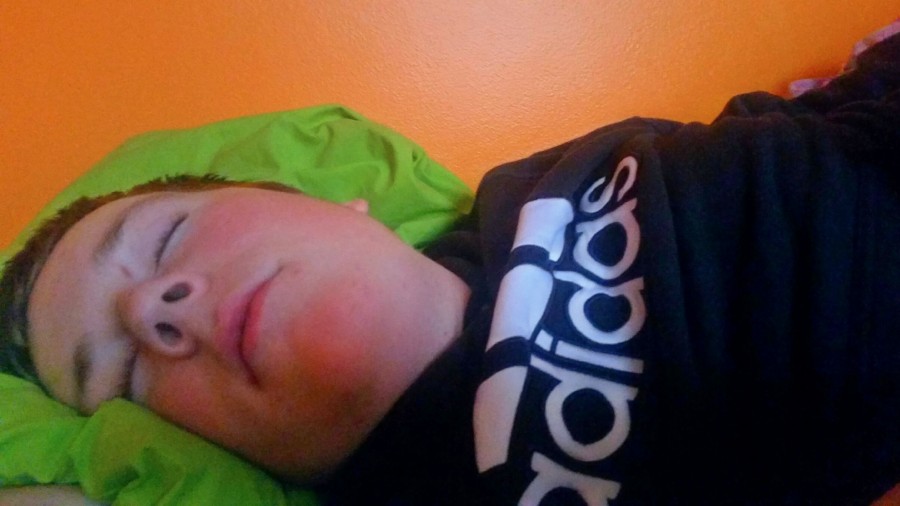Teenagers should sleep more than 8 hours a day
IMAGE / Makenzie Schroeder
Junior Jacob DePottey takes a nap. DePottey only gets an average of 5-6 hours of sleep on school nights.
The recommended amount of sleep for a teenager to function at their best is between 8 1/2 and 9 1/4 hours.
When someone is sleeping they are doing more than just dreaming.
During sleep, the body is performing important functions that allow for day-to-day function. Sleep is food for the brain; when sleeping, the body has a chance to recuperate for the long day ahead.
Many teens are taking their final road test and getting ready to receive their driver’s license.
When it comes to driving, teens must realize that their daily amount of sleep is an important factor to their safety behind the wheel.
Deontae Webster, junior, is getting ready to take his segment two driver’s training course.
“I know having the proper amount of sleep while driving is very important. I don’t want to put myself in harm’s way for not having enough rest,” Webster said.
Drowsiness behind the wheel causes over 100,000 car crashes each year.
Teens that are getting behind the wheel need to receive the recommended 8 1/2 hours to 9 1/4 hours of sleep per night in order to prevent drowsiness. This will reduce the chance of getting into a crash.
Teens that tend to get less hours of sleep at night may see a decrease in their grades.
Without proper rest, teens are limited in their ability to learn, listen, concentrate, and solve problems.
If students sleep in a class, there is a very high chance that they are missing out on important information.
Mr. Jared Rawls, English teacher, said, “When a student is sleeping they are missing a lot: the discussion, the lecture, Q and A, and so many more things that just can’t be made up.”
Lack of sleep can also have a big impact on people’s attitudes and how they feel throughout the day.
Getting less sleep also leads to aggressive and inappropriate behavior.
Drowsiness can make things difficult when dealing with your family and friends.
Junior DeAndrae White understands the consequences of a lack of sleep.
“I know I don’t get enough sleep sometimes, and when I don’t, trust me, it puts me in a bad mood,” White said.
Fortunately, there are ways to fix irregular sleep patterns that affect daily life.
According to The Sleep Foundation’s website, you need to establish a bedtime and wake-up time and stick to it.
A consistent sleep schedule decreases drowsiness and allows the body to get in sync with its natural patterns.
In order to improve their sleep, students should not eat, drink, or exercise within a few hours of their bedtimes. Students should not stay up late doing homework, and they should avoid the TV, computer, and telephone in the hour before bed.
Students that follow these tips will be less drowsy and better prepared to do well in school.

Class: Junior
Clubs: Keystone Club, Boys' & Girls' Club of Greater Flint
Athletics: Football, Track & Field
Hobbies: Volunteer work, Hanging...

Class: Senior
Extracurricular Activities: National Honor Society, DECA
Sports: Varsity dance, varsity tennis
Hobbies/Interests: Reading, shopping,...





